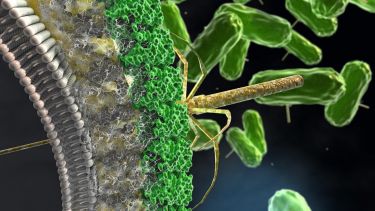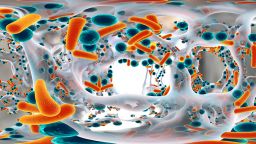Molecular Microbiology: Biochemistry to Disease

Our research
We are a multi-disciplinary group, working on the machinery of microbial life. We explore microbes all the way from their fine molecular structure to their interactions with human hosts and the diseases they cause.
We are trying to understand how microbes live, how they die, how they interact with hosts and how they cause disease. We are seeking answers to some of the most fundamental questions in microbiology: how does three dimensional structure determine molecular and cellular function? What is the genetic basis of these functions? How do bacteria control their responses to their environment? How do bacteria grow and replicate? And how do organisms fight off microbial infections?
Finding answers to these questions will not only advance our understanding of the fundamentals underpinning microbial life but they will also allow us to address key challenges facing humanity. These challenges include tackling increased antibiotic resistance amongst bacterial pathogens, developing interventions for emerging microbial diseases, developing therapies for diseases where we currently have no treatment, and exploiting microbes in more environmentally sensitive approaches to agricultural and industrial processes.
Our division includes a group of scientists with a wide range of different but complementary interests and areas of expertise. We have groups applying structural and imaging techniques (cryo-electron microscopy, NMR spectroscopy, X-ray crystallography, atomic force microscopy and super-resolution fluorescence microscopy) to unravel microbial architecture from individual molecules to whole cells. We exploit and develop computational tools in genomic and proteomic analysis. We are unravelling the biochemical basis of cell signalling, cell growth and antibiotic resistance in disease-causing bacteria such as Staphylococcus aureus, C. difficile, Streptococcus pneumoniae and Streptococcus pyogenes (also known as group A Streptococcus). An important area of research is how these bacteria interact with human and animal hosts and how our immune systems respond to them. These studies extend into clinical analysis and epidemiology.
Research highlights
People
For further information and research opportunities, please see the staff page of individual researchers below:
- Professor Per Bullough
- Dr Roy Chaudhuri
- Dr Erin Cutts
- Professor Tim Daniell
- Dr Robert Fagan
- Dr Andrew Fenton
- Professor Simon Foster
- Dr Indrajit Lahiri
- Dr Laia Pasquina-Lemonche
- Dr. Ian Lidbury
- Dr Oliver Meacock
- Dr Stephane Mesnage
- Dr Lynda Partridge
- Dr John Rafferty
- Dr Claire Turner
- Professor Jon Waltho
- Dr Jason Wilson
- Professor Mike Williamson
Emeritus
- Professor Jeff Green
- Professor David Hornby
- Professor Dave Kelly
- Professor Anne Moir
- Professor Robert Poole
- Professor David Rice
Research Centres of Excellence
Our research on molecular microbiology: biochemistry to disease is supported by and feeds into the following research institutes and Centres of excellence.



